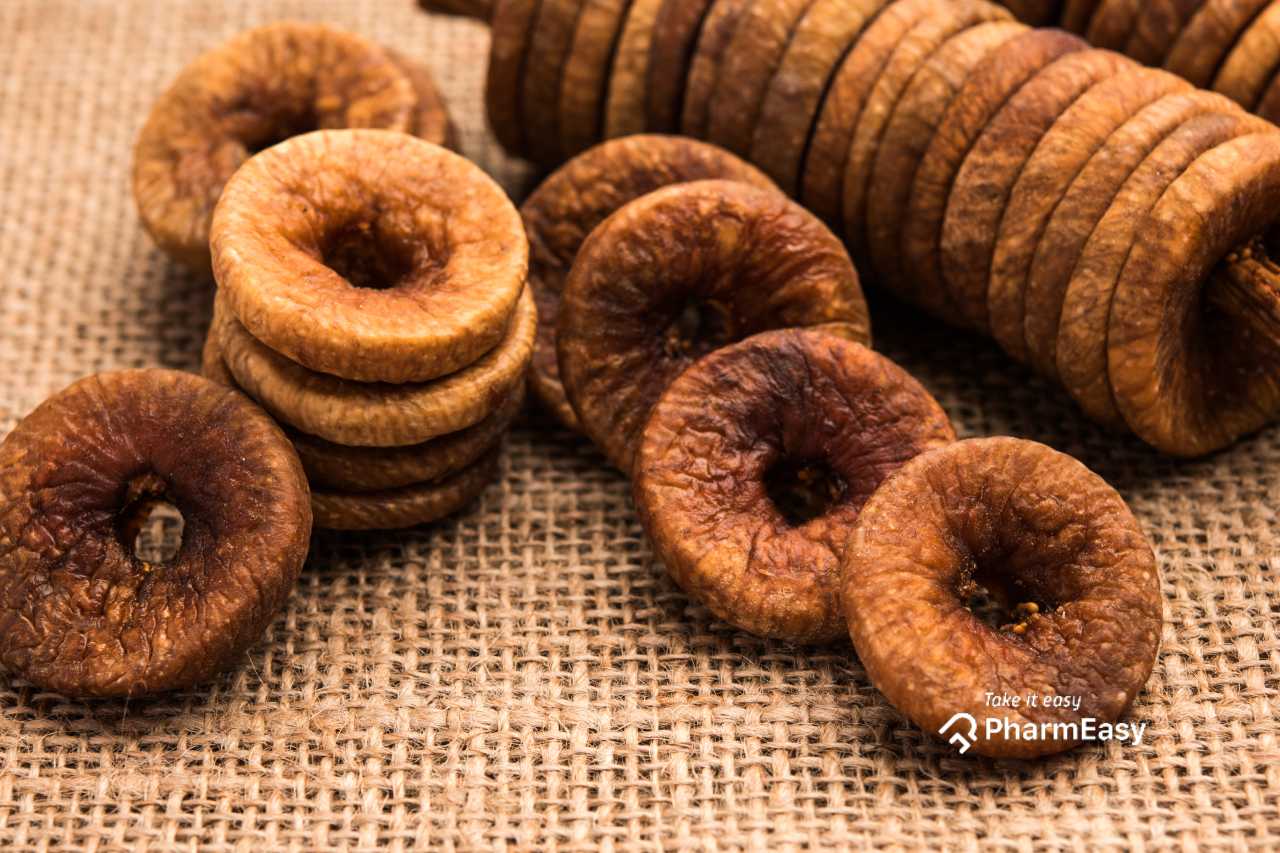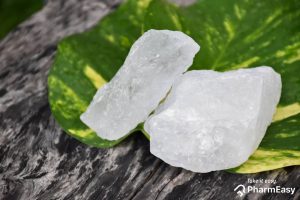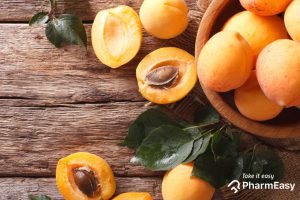Table of Contents
Introduction:
Ficus carica L. is also known as ‘anjir/anjeer’ in Hindi and ‘fig’ in English. It is produced in countries like Egypt, Turkey, Morocco, Spain, Italy, Greece, California, and Brazil. It grows in hot, dry and slightly cold climatic conditions. Figs are consumed worldwide in both dried and fresh forms.1–3 The edible part of anjeer, which is a fruit, is a receptacle, fleshy and hollow.2
Anjeer tree is a native plant of Asia (southwestern part) and has now spread to Europe and other parts of the world. Anjeer plays a vital role in Indian mythology as an object of worship. Anjeer tree has been known to be a rich source of food and medicine since ancient times.3

Nutritional Value of Anjeer:
According to data from the United States Department of Agriculture, dried anjeer has been found to have high nutrient value since it is a rich source of minerals and vitamins compared to other dried fruits.3
Nutrients:
- Carbohydrate: 73.50% per 100 g
- Protein: 4.67% per 100 g
- Fat: 0.56% per 100 g
- Dietary fibre: 3.68% per 100 g
- Energy: 317.78 kcal per 100 g
Minerals:
- Strontium (Sr): Saturated (maximum possible quantity)
- Calcium (Ca): 1,545.46 ppm
- Magnesium (Mg): 679.04 ppm
- Phosphorus (P): 365.75 ppm
- Iron (Fe): 29.49 ppm
- Cadmium (Cd): 0.0034 ppm
- Copper (Cu): 5.02 ppm
- Manganese (Mn): 4.75 ppm
- Arsenic (As): 1.669 ppm
- Chromium (Cr): 1.47 ppm
- Titanium (Ti): 0.3727 ppm
- Nickel (Ni): 1.178 ppm
- Tin (Sn): 1.329 ppm
- Zinc (Zn): 9.87 ppm
- Cobalt (Co): 0.032 ppm
- Lead (Pb): 0.680 ppm
- Lithium (Li): 0.245 ppm
- Molybdenum (Mo): 0.026 ppm
- Thallium (Tl): 1.5686 ppm
- Antimony (Sb): 0.298 ppm
- Selenium (Se): 0.790 ppm
Potential Uses of Anjeer:
Unani, Siddha, Ayurvedic and traditional Chinese medicines use anjeer for various medicinal properties. It is used as a diuretic, expectorant and mild laxative in the Unani medication system.3 Most interesting biological activities of anjeer can be studied to develop healing methods using it in future.2
Parts of anjeer plant such as seeds, fruits, barks, leaves, shoots and latex have been exploited for various medicinal applications. Due to its therapeutic benefits, anjeer has traditionally been used in medicines for the treatment of various conditions such as cardiovascular disorders, colic, loss of appetite, indigestion and diarrhoea (gastrointestinal disorders), cough, sore throat, bronchial problems (respiratory disorders). It is also used as a remedy due to its anti-inflammatory and antispasmodic properties. Studies have also shown that anjeer exhibits the following activities:1
- Hypolipidemic
- Hepatoprotective
- Antidiabetic
- Antipyretic
- Antispasmodic
- Antifungal
- Antibacterial
- Immunomodulatory1
In my experience, fig and fig-based food products have shown promising results in dealing with some dermatological conditions, including atopic dermatitis. The extracts derived from fig plants may help reduce the symptoms associated with this skin condition.
Dr. Siddharth Gupta, B.A.M.S M.D (Ayu)
Benefits of Fig (Anjeer):
1. Benefits of Anjeer as an Effective Antioxidant
- Anjeer consists of phenolic compounds that are beneficial to human health due to their antioxidant activity as hydrogen donators, reducing agents, singlet oxygen quenchers, free radical scavengers, etc.2
- Studies have stated that various constituents of anjeer scavenge reactive oxygen species to prevent damage to deoxyribonucleic acid (DNA), lipids and proteins.3
2. Anticancer Benefits of Anjeer
- Cytotoxic compounds have been extracted from anjeer latex.
- These compounds during in vitro studies exhibited inhibition of proliferation by several cancer cell lines.2
- Thus, anjeer latex is considered a possible inhibitor of the production and development of cancerous cells.3
- Studies on the impact of anjeer latex on stomach cancer cell line growth demonstrate its potential antitumor effects.4
3. Benefits of Anjeer as a Hepatoprotective Agent
- Several studies have shown the potential hepatoprotective activity of anjeer extract.4
- Research on rats studied the petroleum ether extract from leaves of anjeer.
- The extract was evaluated in a study on rats for hepatoprotective activity, and significant reversal of histological, biochemical and functional changes was observed.
- This suggested the prospective hepatoprotective activity of the extract.2
4. Benefits of Anjeer as a Hypoglycaemic Agent
- Antidiabetic effect of extract of anjeer stem bark was demonstrated.
- It was found that the extract restored the blood glucose levels to normal.4
- A study on diabetic rats showed that the anjeer leaf extract has a hypoglycaemic effect.2
- A preclinical study also showed that anjeer and its leaves in food help to control hyperglycaemia.3
5. Benefits of Anjeer in Controlling Cholesterol
- Studies on anjeer leaf extract demonstrated its potential in reducing hepatic triglyceride (TG) and secretion of cholesterol (total cholesterol) and TG from the liver.4
- The results of studies performed on animal models indicate that anjeer fruit may reduce the risk of coronary heart diseases.5
6. Anjeer as an Antibacterial & Antifungal Agent
- Anjeer extract demonstrated antibacterial activity against oral bacteria in a study.
- The effect of the extract in combination with antibiotics against oral bacteria indicated that anjeer could be used as a natural antibacterial agent.2
- Studies also reported that the anjeer leaf extract also exhibits bactericidal activity and moderate antifungal activity.3
7. Benefits of Anjeer Due to its Antipyretic Activity
Extracts of anjeer have been studied to demonstrate a reduction in body temperature and yeast-induced rise in temperature. The extract showed effects comparable to generic antipyretic drugs.2
8. Benefits of Anjeer Against Tuberculosis
- In a study, leaves extract of anjeer was found effective against Mycobacterium tuberculosis (tuberculosis causing bacteria).
- Due to this ability, it is traditionally used in Malaysia for the management of tuberculosis.2
9. Anjeer as an Antispasmodic & Antiplatelet Agent
- Experiments have shown the antispasmodic effect of anjeer extract. Results also show the possibility of the ripe dried fruit having spasmolytic activity.4
- The extract was investigated using an ex-vivo model of human platelets, and the antispasmodic and antiplatelet effects were observed.2
Also Read: Ajwain – Uses, Benefits, Side Effects & Precautions
10. Immunomodulatory Effect of Anjeer
Evaluation and study of its immunomodulatory effect proved that the anjeer extract remarkably improved antibody response.4
Also Read: Cinnamon – Uses, Side Effects & Precautions
Anjeer is popularly sold in dry form to enable access in all seasons. Anjeer is also consumed as juice, leaves decoction, tea and a sweet.
Over the years, I have noticed that including dried figs in the diet taken by those trying to lose weight may be helpful to them. They are rich in phenolic antioxidants and fiber, which aid in reducing oxidative stress, promoting feelings of fullness, and supporting portion control.
Dr. Rajeev Singh, BAMS
Side Effects of Anjeer (Fig)
The side effects of anjeer are as follows:
- A preclinical study shows that the extract of anjeer leaf, when used in high dosage, may cause hepatic damage.3
- Some other studies have also demonstrated that its leaves exhibit moderate toxicity if more than regular dosage is used.6
Precautions to Take With Anjeer
You should keep the following points in mind:
- Due to the possible toxicity of anjeer leaves (when consumed in high quantities), it is advised that you should take precautions and seek advice from an Ayurvedic practitioner regarding the safe quantity of anjeer leaves that can be used.6
- Anjeer helps in lowering blood sugar levels. However, people with diabetes, when consuming fig orally, should monitor blood sugar levels regularly.4,3
Interaction With Other Drugs
Anjeer contains phenolic compounds, which have anticoagulant activity. Patients taking blood thinners may consult their doctors before taking anjeer in a regular diet.7
Eating anjeer may lower blood sugar. Therefore, one must monitor their blood sugar closely. Also, the dose of diabetes medication may need to be changed on medical advice.4,3
Frequently Asked Questions (FAQs)
Yes, anjeer shows antiacne activity, according to studies. It has been reported that the extract of its fruits and leaves shows antiacne activity, almost comparable to that of generic medicines.3
Yes, it was found in a study that its leaf extract influenced sperm parameters and improved sperm count. Some studies also reported the aphrodisiac activity of anjeer extract, but the result was found to be dose-dependent.4
Yes, anjeer can be used as a mild laxative. Specifically, anjeer fruit is used to treat constipation due to its laxative properties.1,3
Yes, the anjeer leaves possess anticholinesterase and anti-HSV-1 (herpes simplex virus type 1) activity; reports state that cholinesterase and HSV-1 infection have a role in the progression of Alzheimer’s disease. Therefore, after extensive research, it can be utilised as a possible treatment for Alzheimer’s disease.6
Yes, according to a study, the extract of anjeer has been found to be effective in lowering urea, serum creatinine, and blood urea nitrogen level, which indicates the nephroprotective effect of anjeer.3
Yes, polyphenols present in anjeer contain pharmacologically active components that act as anticoagulants. These components may be helpful to prevent bleeding disorders.7
No, there have not been any reported evidence or studies that support the anti-HIV properties of anjeer.
Yes, anjeer or figs promote the release of melatonin in the body, which is responsible for regularising sleep cycles and helps in insomnia management. It also increases serotonin levels in your brain, reduces stress, and anxiety and improves sleep quality.
Anjeer contains hair-friendly nutrients like magnesium, vitamin C, and vitamin E which promote hair growth. These nutrients stimulate blood circulation in the scalp to accelerate hair growth. You may use anjeer powder or oil for your hair.
Since women are more anaemic, they must consume anjeer which is a rich source of iron. Regular consumption of anjeer will lead to an increase in haemoglobin levels in the blood. Pregnant women must also have anjeer as it is loaded with nutrients, it is beneficial for the development of the foetus and strengthens the bones of the mother. It may also relieve symptoms of morning sickness but always speak to the doctor regarding the amount you must eat.
References:
- Soni N, Mehta S, Satpathy G, Gupta RK. Estimation of nutritional, phytochemical, antioxidant and antibacterial activity of dried fig (Ficus carica). J Pharmacogn Phytochem. 2014 Jul;3(2):158-65. https://www.phytojournal.com/vol3Issue2/Issue_jul_2014/3-3-1.1.pdf
- Mawa S, Husain K, Jantan I. Ficus carica L. (Moraceae): phytochemistry, traditional uses and biological activities. Evid Based Complement Alternat Med. 2013 Jan;2013:974256. https://www.hindawi.com/journals/ecam/2013/974256/
- Salma, Shamsi Y, Ansari S, Nikhat S. Ficus carica L.: a panacea of nutritional and medicinal benefits. Cellmed. 2020;10(1):1. https://www.koreascience.or.kr/article/JAKO202014264110083.page
- Rahmani AH, Aldebasi YH. Ficus carica and its constituents role in management of diseases. Asian J Pharm Clin Res. 2017;10(6):49-53. https://www.researchgate.net/profile/Arshad-Rahmani/publication/318024762_Ficus_carica_and_its_constituents_role_in_management_of_diseases/links/5a467823458515f6b0558c7d/Ficus-carica-and-its-constituents-role-in-management-of-diseases.pdf
- Alamgeer, Iman S, Asif H, Saleem M. Evaluation of antihypertensive potential of Ficus carica fruit. Pharm Biol. 2017 Jan;55(1):1047-53. https://www.tandfonline.com/doi/full/10.1080/13880209.2017.1278611
- Li Z, Yang Y, Liu M, Zhang C, Shao J, Hou X, et al. A comprehensive review on phytochemistry, bioactivities, toxicity studies, and clinical studies on Ficus carica Linn. leaves. Biomed. Pharmacother. 2021 May;137:111393. https://www.sciencedirect.com/science/article/pii/S0753332221001785
- Belattar HH. Phytochemical composition and biological characterization of fig leaves and fruits. RHAZES: Green Applied Chemistry. 2021 Feb;11:89-96. https://revues.imist.ma/index.php/RHAZES/article/view/25071
Disclaimer: The information provided here is for educational/awareness purposes only and is not intended to be a substitute for medical treatment by a healthcare professional and should not be relied upon to diagnose or treat any medical condition. The reader should consult a registered medical practitioner to determine the appropriateness of the information before consuming any medication. PharmEasy does not provide any guarantee or warranty (express or implied) regarding the accuracy, adequacy, completeness, legality, reliability, or usefulness of the information; and disclaims any liability arising thereof.
Links and product recommendations in the information provided here are advertisements of third-party products available on the website. PharmEasy does not make any representation of the accuracy or suitability of such products/services. Advertisements do not influence the editorial decisions or content. The information in this blog is subject to change without notice. The authors and administrators reserve the right to modify, add, or remove content without notification. It is your responsibility to review this disclaimer regularly for any changes.



 By
By 












Comments